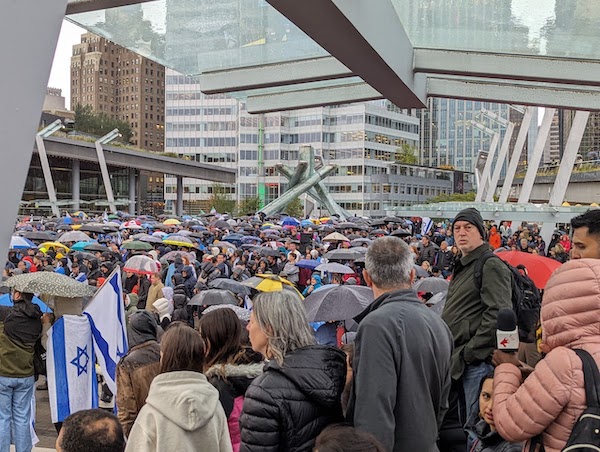An Israeli cabinet minister visited Canada recently and, with due respect, some of our journalistic colleagues buried the lede.
In journo parlance, the “lede” is the most important and, therefore, first item mentioned in a conventional news story. To “bury the lede” is to (intentionally or unintentionally) downplay the most important thing that happened by talking about other things first.
This was the case when Amichai Chikli, Israel’s new minister for Diaspora affairs and combating antisemitism, visited Canada recently. Some of our colleagues reported on Chikli’s condemnations of Canada’s government for not following some other countries in moving our embassy to Jerusalem from Tel Aviv and commended the Conservative party for “unwavering support for Israel and Jerusalem.” The minister’s abandonment of international diplomatic protocols appeared lower in the coverage.
It seems to us that there is a bigger story than an Israeli pol backslapping overseas allies and criticizing the government in power – although that is not unrelated from the bigger problem here. The main thing – the lede, as it were – is that an Israeli government minister came to Canada, sidestepped conventional protocols around meeting with commensurate-level officials, hung out instead with an ad hoc group of mostly opposition members of Parliament, spoke to an evangelical Christian audience and then scooted back to the Middle East.
Canada and Israel have deep, historic bilateral bonds. The Jewish community in Canada is tied to Israel emotionally, spiritually and familially. There have been diplomatic disagreements between our governments – and, indeed, there are some very basic divergences right now between Canadian Jews and what is happening in the Jewish state – but there are ways that things are done. And there are ways that things are just not done.
For four years, what many people view as the highest political office in the world was held by a man who betrayed every diplomatic nicety and convention imaginable. It may be that, among the countless ways the former U.S. president’s smashing of standards has lowered the collective bar, an Israeli politician sees it as acceptable to barge into Canada and behave as though he is a free agent rather than an official representative of the Israeli people. Canadians should not see it as acceptable. Canadian Jews should be particularly concerned.
An elected official who is not a member of a cabinet is free to travel to foreign lands and meet with ideological cohorts. A member of the government is expected to represent his (or her) country, not their own narrow interests.
The Canadian group that hosted Chikli – a new entity called the Israel Allies Caucus – is also to blame. Apparently operating outside the more formalized parameters of the longstanding official Canada Israel Interparliamentary Group, the new body appears to be made up of evangelical Christians and political conservatives, and it is abandoning protocols in favour of its own agenda. This should be particularly concerning to Canadian Jews who care about our country’s relations with Israel, as well as being overshadowed by groups that may not represent our interests.
Presumably, the new group views Canada’s official approach to Israel as not the right kind of support – but the specifics of government policy are not the biggest issue here.
Let us not forget that there are activists in Canada who recently tried to prevent former Israeli prime minister Naftali Bennett from entering Canada, accusing him of being a “war criminal.” Other voices, critical of policies of the current government, want to ban representatives of that government based on political disagreements.
Diplomatic protocols exist to create a space where representatives of countries can keep lines of communication open even when we have grievous disagreements, as we do, for example, with the worst human rights violators in the world. Indeed, Canada has carved out a role in the world as a “soft power” that uses words, rather than weapons, to bring sparring parties closer together.
If we diverge from diplomatic protocols and allow activists on any side to subvert these carefully constructed channels of communication, we risk further politicizing issues that should be above politics. More to the point, making Canada’s relations with Israel a political football is to risk long-term gain for someone’s perception of short-term gain. It may have made partisan ideological activists feel good to shmooze with an Israeli cabinet minister. It will feel less good for all concerned when policies that strengthen the Canadian-Israeli bond become viewed through a prism of which Canadian political parties benefit from their adoption.
Further, if we accept, from apparently “pro-Israel” activist MPs, a flouting of protocol, we will be hard pressed to complain when MPs host other overseas visitors we might view as troubling. If an opposition MP invites an Israeli, Palestinian or other speaker that many or most Canadian Jews view as deeply problematic and rolls out the red carpet on Parliament Hill as the Israel Allies Caucus did for Chikli, we will have no moral pedestal from which to complain.
Chikli should have known better. Higher-ups in his government should dress him down for his breach of protocol. But it was the leader of his government – the prime minister of Israel – who first and most egregiously breached such protocols, accepting an invitation several years ago from the U.S. Congress, rather than the U.S. president. (Of course, it was the Congress that broke the protocol first by extending the invitation, so we are addressing a larger pattern of inappropriate behaviour.) But Canadian Jews, even – perhaps especially – those who most enthusiastically welcomed Chikli, his undiplomatic behaviour and his impolitic remarks (whether we agreed with them or not!), should be aware of the unwelcome precedent they may have set.

